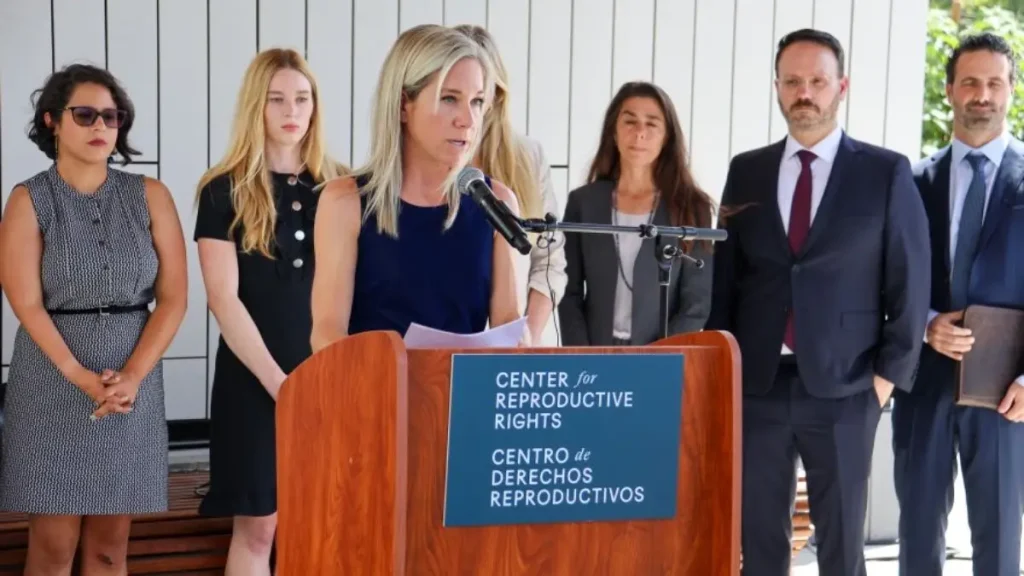Texas Hospital Found in Violation of Federal Law After Sending Woman with Ectopic Pregnancy Home
If you’ve been following recent news, you might have heard about a Texas hospital being found in violation of federal law after discharging a woman with an ectopic pregnancy. It’s a story that has sparked outrage and raised serious questions about the care patients can expect, especially when it comes to life-threatening medical situations.
But what exactly happened? Why is this case making headlines? And why should we, as individuals and members of a healthcare system, care about this violation?
In a nutshell, the hospital’s decision to discharge a woman with a doomed pregnancy goes against critical federal laws designed to protect patients. The law, which mandates that hospitals provide emergency care to stabilize patients, was violated, placing the woman’s health and safety at risk. And it’s not just about one woman’s tragic experience—it points to larger, systemic issues that could affect many others.
You might be wondering, “How could this happen? What went wrong?” Let’s break it down, starting with the basics: what an ectopic pregnancy is, and why it’s so dangerous.
Background: The Ectopic Pregnancy Case and the Texas Hospital Incident
Let’s dive deeper into the incident that’s making waves in the news. The case involves a woman who went to a Texas hospital seeking help for a nonviable pregnancy. Unfortunately, instead of receiving the emergency care she needed, she was discharged—despite clear medical evidence that her pregnancy was ectopic. This situation placed her life in serious danger.
According to PBS News, the woman’s condition was far from stable, and sending her home without appropriate care is considered a serious violation of federal healthcare laws. The decision by the hospital didn’t just ignore medical protocol—it also disregarded the patient’s right to necessary emergency care under federal law .
Now, you might wonder how this violation could happen. Hospitals are required to treat patients in critical conditions, especially when their life or health is at risk. By discharging this woman, the hospital clearly failed to follow that mandate.
This incident also underscores the growing tensions surrounding abortion laws in Texas, where state laws on pregnancy care can sometimes clash with federal protections. In this case, the hospital’s actions may have been influenced by the complexities of those regulations. However, the violation is clear.
What is an Ectopic Pregnancy? Key Medical Insights
So, what exactly is an ectopic pregnancy, and why is it such a big deal?
An ectopic pregnancy occurs when the fertilized egg implants outside the uterus, often in one of the fallopian tubes. It’s dangerous because the growing embryo can cause the tube to rupture, leading to internal bleeding—a life-threatening emergency. Without treatment, this can lead to severe health complications or even death.
As someone who may not be familiar with pregnancy complications, you should understand that this isn’t just a medical issue—it’s a matter of life or death. That’s why the woman in this case needed immediate attention. The fact that she was sent home without treatment shows how crucial it is for hospitals to follow the right procedures.
Understanding this risk is key to appreciating the severity of the hospital’s mistake. A simple medical procedure could have saved her life, but instead, she faced unnecessary danger.
Have you or someone you know experienced a situation similar to this? Share your thoughts or experiences in the comments below—let’s discuss the implications of such critical medical oversights.
Legal Implications: How the Hospital Violated Federal Law

Now let’s talk about the legal side of this. According to an AP News report, this case revolves around the violation of EMTALA (Emergency Medical Treatment and Labor Act), which ensures that patients receive emergency care regardless of their ability to pay or their status .
The law requires hospitals to stabilize any patient facing an emergency situation. In this case, the woman’s condition was a medical emergency, and the hospital had an obligation to provide the necessary treatment. Discharging her without stabilizing her was not only medically irresponsible but also a direct breach of federal law.
This isn’t just a minor slip-up—it’s a legal violation with serious consequences. Hospitals found guilty of such violations could face penalties or lose their federal funding. But beyond that, it also raises bigger questions about how patients’ rights are handled, especially when dealing with high-risk pregnancies.
You might be wondering: How do such legal oversights happen in a healthcare setting? Unfortunately, it’s all too common, and often linked to miscommunication or inadequate staff training. This case, however, is a wake-up call for all hospitals to take federal healthcare laws seriously.
How Did the Investigation Unfold? Key Findings and Federal Inquiry Results
Following the incident, a federal investigation was launched. The results were troubling. Federal authorities examined the hospital’s actions and found that the discharge violated clear healthcare regulations. The investigation revealed that the hospital did not adhere to necessary protocols when treating the woman, and their failure to act appropriately led to this violation.
It’s important for you to understand that investigations like these are thorough, often taking months. They don’t just look at the facts—they analyze the hospital’s procedures, review medical records, and interview staff involved. The findings confirmed what many feared: the woman was wrongly discharged, and the hospital’s actions fell short of the legal requirements.
While the exact penalties for the hospital are still unfolding, this case serves as an example of why strict adherence to healthcare laws is non-negotiable. Patient safety must always come first, and hospitals must be held accountable when they fail to meet those standards. This case should be a reminder that in healthcare, every decision matters—especially when it comes to life-threatening situations.
Do you think the hospital’s decision was influenced by state laws? Was there a failure in medical ethics? Drop your thoughts in the comments below. We’d love to hear your perspective on this controversial case.
Repercussions: Impact on the Hospital and Medical Community
This incident isn’t just a one-off mistake; it has broader consequences for the hospital and the medical community. For the hospital, the legal and financial repercussions could be severe. If found guilty, they could face hefty fines or lose federal funding, which could significantly impact their operations.
For the medical community, this case sends a clear message: patient safety and adherence to federal laws must always come first. If you’re a healthcare professional or just someone concerned about healthcare practices, this serves as a reminder of how crucial it is to follow medical protocols, especially in emergency situations.
As discussions around this case continue, there are often insightful conversations happening in spaces like X, Facebook, Reddit and WhatsApp groups, where people share real-time updates, exchange knowledge, and discuss how these issues might evolve. It can be an interesting way to stay connected and informed on similar stories and developments.
What Are the Ethical and Moral Questions Raised?

Beyond the legal and medical aspects, this case raises serious ethical and moral questions. How could a hospital discharge a woman in such a dangerous medical state? Was there an ethical breakdown in judgment? Should the hospital have done more to ensure her safety?
As someone reading this, you might feel uneasy about the choices made by the healthcare providers involved. This situation makes us think about the broader ethical responsibility healthcare providers have to their patients—especially when lives are at stake. It’s clear that this incident isn’t just a legal misstep; it’s a failure of basic medical ethics.
What Comes Next for the Woman and Other Affected Patients?
As for the woman at the center of this case, her health may have been put at risk, but she isn’t alone. Other patients in similar situations could face the same neglect unless this case sparks real change. This incident might prompt hospitals to reassess their protocols to ensure something like this never happens again.
For you, as a reader, it’s important to realize that systemic changes might be on the horizon. Whether it’s through stricter hospital regulations or new laws, this case could lead to significant reforms that ultimately benefit patients everywhere.
If you want to stay informed on healthcare stories and the latest legal cases that impact patient care, be sure to follow us for more insights and updates.
Final Thoughts
This case has shown us one thing clearly: when medical protocols are ignored, lives are at risk. The legal violations here are not just about following the rules—they’re about ensuring patient safety and trust in the healthcare system.
Going forward, there will likely be increased scrutiny on hospitals across the country, especially in states with controversial laws. If we want real change, we have to push for better care standards, more accountability, and stronger protections for patients.
As you finish reading this, ask yourself: What can we do to ensure that incidents like this never happen again? Share your thoughts or experiences, and let’s keep the conversation going.
Disclaimer: The information provided in this article is for educational purposes only. It is not intended as medical or legal advice. Always consult with a healthcare professional or legal expert for specific guidance related to your situation.


